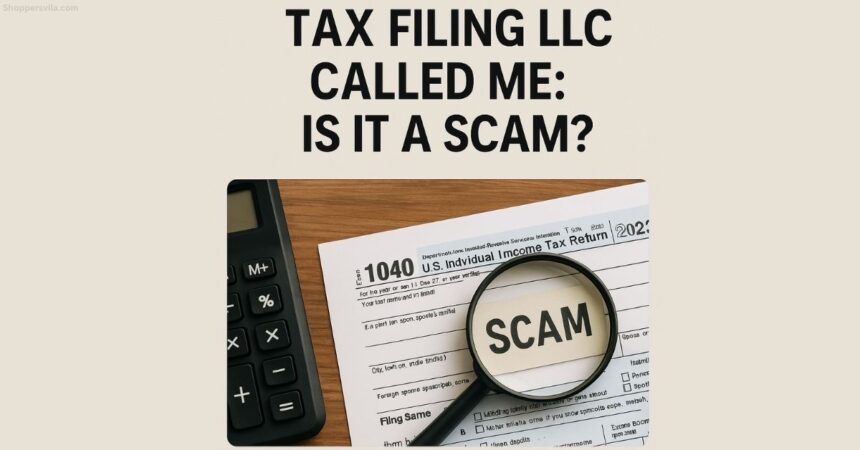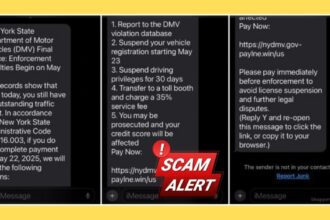Are you receiving threatening phone calls from companies claiming to handle your federal tax matters? You’re not alone. Thousands of Americans are being targeted by sophisticated tax scam operations using names like “Sawyer Thomas Jackson Tax Filing LLC” and “Tony Snow Tax Flags LLC” to steal money and personal information.
Tax-related phone scams have reached epidemic proportions, with the Federal Trade Commission reporting over 165,000 tax scam complaints in 2024 alone. These fraudulent operations prey on people’s fear of the IRS and use high-pressure tactics to extract money from unsuspecting victims.
Overview of Tax Filing LLC Scams
Tax filing scam operations have evolved significantly over the past decade. These sophisticated schemes use official-sounding company names, professional voice recordings, and detailed scripts to convince victims they owe money to the IRS or other tax authorities.
The scammers behind these operations often use names of deceased public figures or create entirely fictional personas to add legitimacy to their claims. They target people of all ages and income levels, but particularly focus on young adults who may be unfamiliar with how the IRS actually operates.
These fraudulent companies typically operate from call centers, sometimes located overseas, and use spoofed phone numbers to hide their true identity. They create an sense of urgency and fear to prevent victims from thinking critically about their claims.
How These Tax Scam Operations Work
Tax filing scams follow a predictable pattern designed to maximize their success rate:
Initial Contact: Scammers place robocalls or leave voicemails claiming to be from a tax resolution company. They use urgent language suggesting immediate action is required to avoid severe consequences.
Fear Tactics: The message includes threats of wage garnishment, frozen bank accounts, property seizure, or even arrest. These threats are designed to create panic and bypass logical thinking.
False Authority: Scammers claim to represent legitimate tax resolution services or suggest they have special relationships with the IRS. They may reference real tax relief programs to add credibility.
Urgency Creation: The message emphasizes that relief programs are “expiring fast” or that this is the “final opportunity” to resolve the issue, preventing victims from seeking advice or verification.
Information Harvesting: When victims call back, scammers attempt to collect personal information including Social Security numbers, bank account details, and credit card information.
Payment Demands: Ultimately, scammers demand immediate payment through untraceable methods like gift cards, wire transfers, or cryptocurrency.
Real Phone Call Transcript Examples
Here are actual transcripts from recent tax scam calls:
Example 1 – “Tony Snow Tax Flags LLC”: “This is Tony Snow with tax Flags LLC I’m calling because an unresolved federal tax matter will trigger an urgent enforcement escalation this is not a routine call this file has been flagged for immediate action and I’m seriously concerned about what could happen next as of right now you could be facing imminent enforced collections we’re talking wage garnishment Frozen bank accounts even seizure of property…”
Example 2 – “Sawyer Thomas Jackson Tax Filing LLC”: “File has been flagged for potential priority handling and I wanna make sure you know what’s coming next right now you could be facing enforce collections things like wage garnishments frozen bank accounts or even property seizures these actions sometimes happen quickly and I’d rather you not find out after it’s too late…”
Common Elements in These Transcripts:
- Robotic, text-to-speech delivery
- Grammatical errors and awkward phrasing
- Vague references to “federal tax matters”
- Immediate threats of serious consequences
- Pressure to call back immediately
Red Flags: How to Spot Tax Scams
Recognizing tax scams becomes easier when you know what to look for:
Communication Method Red Flags
- Unsolicited phone calls about tax issues
- Text-to-speech recordings rather than human voices
- Urgent voicemails demanding immediate callback
- No official documentation provided
Content Red Flags
- Vague language about tax issues without specific details
- Immediate threats of arrest, property seizure, or wage garnishment
- Pressure tactics claiming “final opportunity” or “expiring programs”
- Third-party companies claiming to handle federal tax matters
Behavioral Red Flags
- Demands for immediate payment via gift cards or wire transfers
- Requests for personal information over the phone
- Refusal to provide written documentation
- Aggressive or threatening tone
Legitimacy Red Flags
- Company names that don’t appear in official databases
- Phone numbers that don’t match official IRS contact information
- Claims about special relationships with the IRS
- Promises of guaranteed tax relief
How to Identify and Protect Yourself from Tax Scams
Verification Steps
Research the Company: Look up any company claiming to contact you about taxes. Legitimate tax resolution companies have official websites, business registrations, and customer reviews.
Check IRS Records: Create an online account at IRS.gov to view your actual tax status and any legitimate communications from the IRS.
Verify Contact Information: Cross-reference phone numbers and addresses with official sources. Scammers often use fake contact information.
Ask for Documentation: Legitimate tax issues always involve written correspondence. Request official documentation before taking any action.
Protection Strategies
Never Provide Personal Information over the phone to unsolicited callers, regardless of their claims or threats.
Don’t Make Immediate Payments in response to phone calls. Legitimate tax issues follow formal processes with multiple opportunities to respond.
Document Everything including phone numbers, names mentioned, and exact wording of threats or claims.
Report Suspicious Activity to the Federal Trade Commission, IRS, and your state attorney general’s office.
Education and Awareness
Understanding how the IRS actually operates is your best defense against tax scams:
- The IRS primarily communicates through postal mail
- They provide detailed explanations of any tax issues
- Multiple notices are sent before any enforcement action
- You always have the right to appeal or set up payment plans
- The IRS never demands immediate payment via gift cards or wire transfers
What to Do If You’ve Been Targeted
Immediate Actions
Don’t Panic: Remember that legitimate tax issues follow formal processes with multiple opportunities to respond and resolve problems.
Don’t Call Back: Avoid calling the numbers provided in suspicious messages, as this confirms your number is active and may result in more scam attempts.
Block the Number: Use your phone’s blocking features to prevent further contact from scam numbers.
Document the Incident: Keep records of all communications, including voicemails, texts, and any other contact attempts.
Verification Steps
Check Your Tax Status: Log into your official IRS account online to verify whether you actually have any outstanding tax issues.
Contact the IRS Directly: If you have concerns about your tax status, contact the IRS using official phone numbers from their website.
Consult a Tax Professional: If you do have legitimate tax concerns, work with a certified public accountant or enrolled agent.
Reporting Procedures
Federal Trade Commission: File a complaint at reportfraud.ftc.gov to help authorities track and shut down scam operations.
IRS: Report tax scams to the Treasury Inspector General for Tax Administration at tips.tigta.gov.
State Authorities: Contact your state attorney general’s office to report the scam and protect other residents.
If You’ve Already Fallen Victim
Contact Your Bank: If you provided financial information, immediately contact your bank and credit card companies to secure your accounts.
Monitor Your Credit: Place fraud alerts on your credit reports and monitor for suspicious activity.
File a Police Report: Create an official record of the fraud, which may be helpful for recovery efforts and insurance claims.
Seek Professional Help: Consider working with a certified tax professional to address any legitimate tax concerns and clean up any damage caused by the scam.
Frequently Asked Questions
Is Sawyer Thomas Jackson Tax Filing LLC Legit?
No, “Sawyer Thomas Jackson Tax Filing LLC” is not a legitimate tax resolution company. This name is being used by scammers to trick people into believing they’re dealing with a real business. Legitimate tax resolution companies have verifiable business registrations, official websites, and established reputations that can be researched through consumer protection agencies.
Does the IRS Call People About Tax Issues?
The IRS rarely makes phone calls and almost never makes unsolicited calls about tax issues. The IRS primarily communicates through official mail sent via the United States Postal Service. When the IRS does make phone calls, it’s typically only after they’ve sent multiple written notices and the taxpayer has failed to respond. Even then, IRS agents will never threaten immediate arrest or demand payment via gift cards.
How Can I Verify If a Tax Issue Is Real?
The most reliable way to verify any tax issue is to create an online account at IRS.gov and review your tax transcripts and account status directly. You can also call the IRS directly using the official phone numbers listed on their website. Never rely solely on information provided by unsolicited callers or third-party companies claiming to represent you with the IRS.
What Should I Do If I Already Gave Money to a Tax Scammer?
If you’ve already sent money to a tax scammer, immediately contact your bank or credit card company to report the fraud and attempt to reverse the transaction. File reports with the FTC, IRS, and local law enforcement. If you provided personal information, monitor your credit reports closely and consider placing a fraud alert or credit freeze on your accounts.
How Can I Protect Elderly Family Members from Tax Scams?
Educate elderly family members about how tax scams work and establish a plan where they contact you or another trusted family member before responding to any tax-related communications. Consider setting up call blocking on their phones and regularly checking their mail for legitimate IRS correspondence. Many elderly people are specifically targeted by these scams due to perceived vulnerability.
Conclusion
Tax scams using names like “Sawyer Thomas Jackson Tax Filing LLC” and “Tony Snow Tax Flags LLC” are sophisticated operations designed to steal your money and personal information. These scammers exploit people’s natural fear of the IRS and use high-pressure tactics to prevent critical thinking.
Remember that the real IRS follows formal procedures, communicates primarily through mail, and never demands immediate payment via untraceable methods. When in doubt, always verify tax issues through official IRS channels and never provide personal information to unsolicited callers.
By understanding how these scams work and knowing the warning signs, you can protect yourself and your loved ones from becoming victims. Share this information with friends and family to help them stay safe from these increasingly sophisticated tax fraud operations.
Stay informed about the latest scams and consumer protection tips with ShoppersVila.com – your trusted source for financial safety and smart shopping guidance.









































